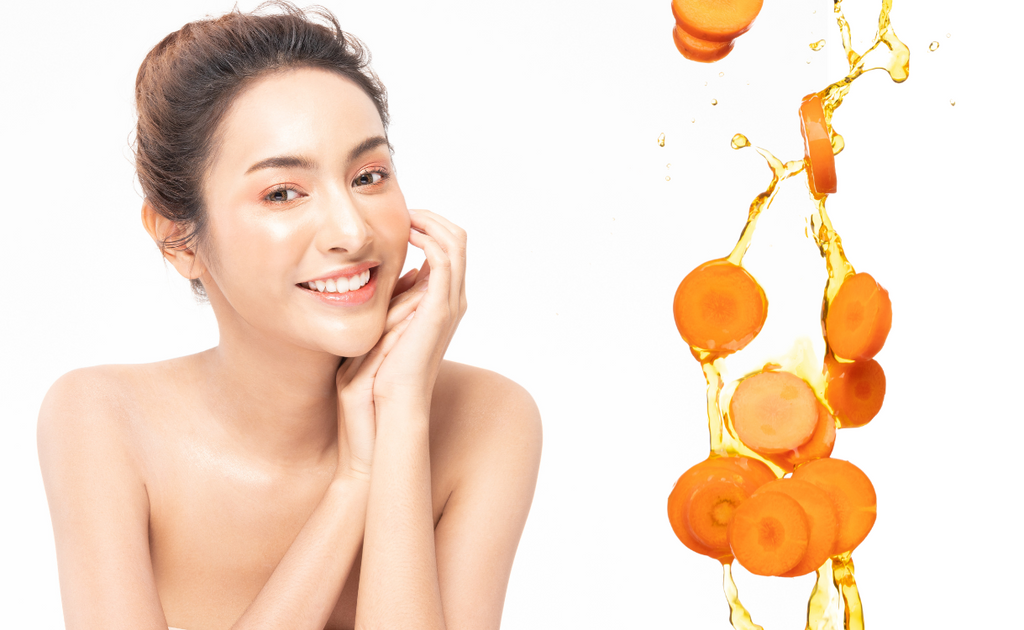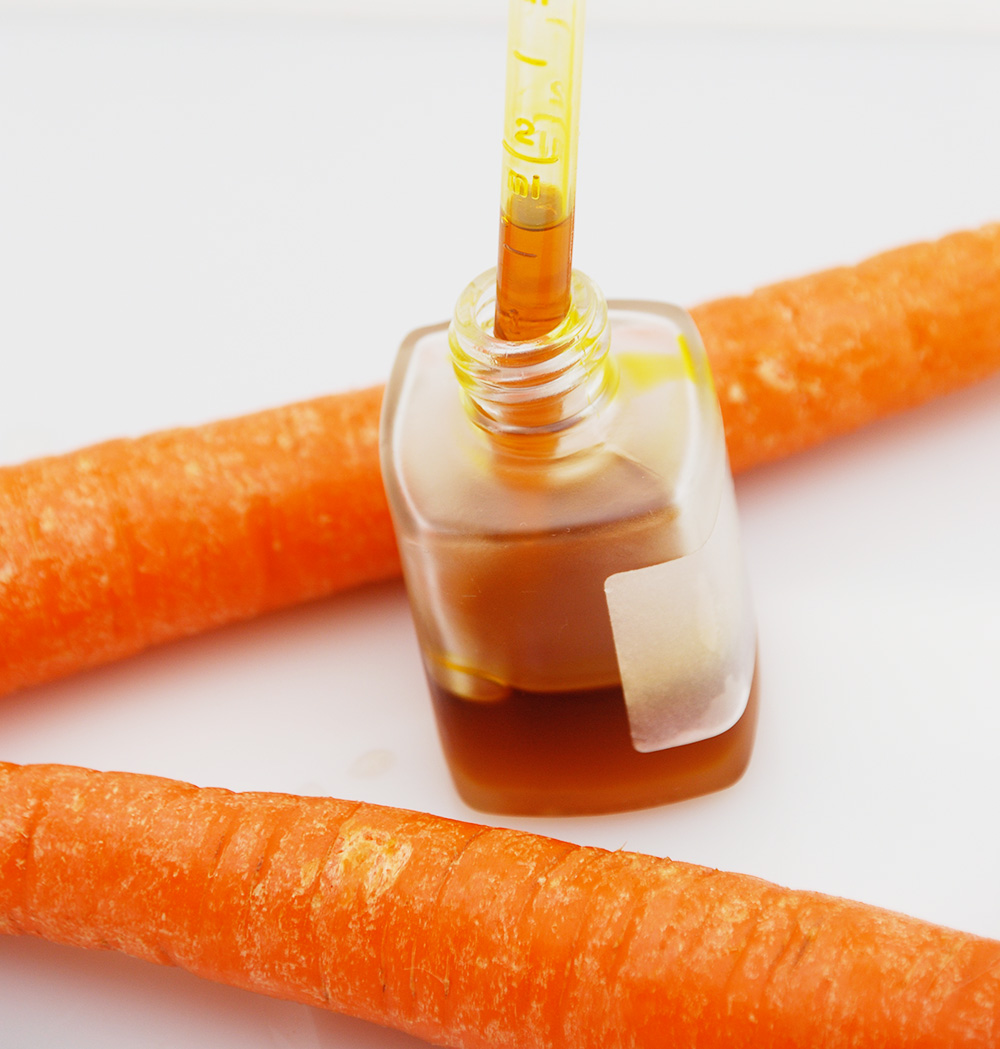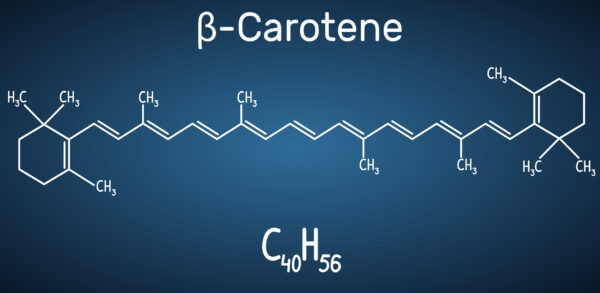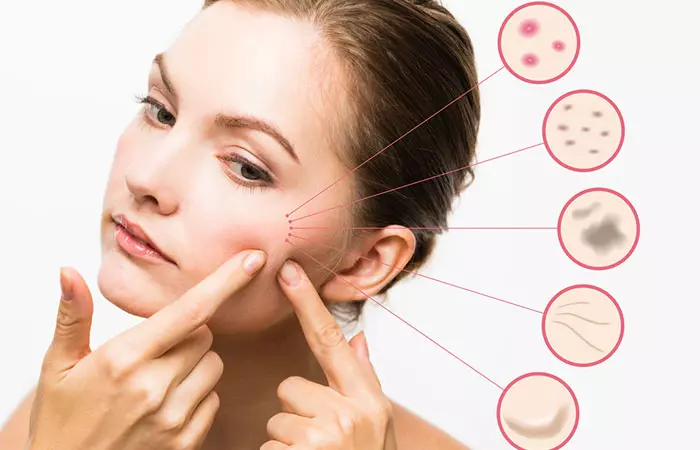What does beta-carotene do for skin?
Beta-carotene is a red-orange pigment present in a variety of fruits and vegetables, the most prominent of which are carrots, sweet potatoes, pumpkins, and spinach. It belongs to the carotenoid family of chemicals, which operate as antioxidants in the body. When beta-carotene is taken in the diet, it is transformed into vitamin A, a necessary ingredient for keeping healthy skin, among other things.
Keep in mind that skincare is a personal journey, and what works for one person might not work for another. If you have specific skin concerns or conditions, it is always best to seek the advice and recommendations of a dermatologist or skincare professional.

What is Beta Carotene?
Beta-carotene, a brilliant red-orange pigment found in many fruits and vegetables, has long been associated with the color of particular foods. However, its significance goes much beyond that of a colorant. This natural component belongs to the carotenoid family, which contains vital minerals with strong antioxidant capabilities.
Beta-carotene is well-known for its function in improving overall health and well-being, particularly in skin health. Antioxidants are critical in protecting the body from dangerous free radicals, which are unstable chemicals that can damage cells and lead to aging and other health problems. Beta-carotene is a powerful antioxidant that aids in the neutralization of free radicals and the reduction of oxidative stress.

Types of Carotenoids
Carotenoids can be either fat-soluble Carotenes- Alpha-carotene, Beta Carotene, Lycopene, or water soluble kinds of Xanthophylls - Lutein, Zeaxanthin, Astaxanthin. Among these, Beta carotenes have a significant antioxidant and proVitamin A activity in our body and form a major part of our diet & body.
Properties of Beta Carotene
UV rays can damage our skin in a number of ways which usually starts with redness. If skin defenses are not strong, it can cause sunburns, photosensitivity, accelerated aging, deterioration of skin immunity, and even skin cancers.
Antioxidants in our body fight this damage but they get consumed with time. When Beta carotenes are taken in diet or applied topically, they get stored in our body, thanks to their fat soluble nature, and protect us from the harmful effects of UV rays and other such oxidative damages.
The benefits of these fat-soluble colored compounds can be attributed to their 4 major properties:
Dietary Antioxidant: By protecting our skin from damage caused by free radicals, it slows down skin aging and protects the body from environmental stressors like UVR, Pollution, Smoking, etc.
Provitamin A: One molecule of beta carotene is metabolized in the gut to two molecules of Retinol. Retinol is the active form of Vitamin A and a very popular anti-aging molecule, needed for healthy skin, hair, and nails. The benefit of beta carotene over Vitamin A is that the conversion is regulated by our gut and the rest is stored as beta-carotene, thus protecting us from Vitamin A toxicity.
Skin Defense & Photoprotection: It prevents redness caused by UV rays and is protective in sun-aggravated conditions and saves the skin from sunburns. It strengthens the immune system and reduces the risk of developing skin cancer.
Natural Coloring agent: The colorful properties are not only used by Mother Nature to make the food palatable but also used in cosmetics and foods as natural colorants, approved by the FDA.

What are the benefits for the skin?
Beta-carotene has several skin health benefits, making it an important component of skincare routines. The following are the main ways that beta-carotene can promote healthy and radiant skin:
-
Antioxidant Protection: Beta-carotene is a powerful antioxidant that aids in the neutralization of free radicals in the skin. Free radicals are unstable molecules produced by environmental factors such as UV radiation, pollution, and smoking, as well as the body's natural metabolic processes. These free radicals can damage skin cells, causing premature ageing, wrinkles, and other skin problems. By combating free radicals, beta-carotene protects the skin from oxidative stress and keeps it looking young.
-
UV Damage Reduction: While beta-carotene cannot replace sunscreen, some research suggests that when combined with other antioxidants such as vitamins C and E, beta-carotene may improve the skin's ability to defend against the harmful effects of UV radiation. UV rays can cause sunburn, premature aging of the skin, and an increase in the risk of skin cancer. The ability of beta-carotene to reduce UV-induced skin damage can be a valuable supplement to sun protection measures.
-
Skin Cell Turnover: Beta-carotene promotes skin cell turnover, which is necessary for a smooth and radiant complexion. The texture and appearance of the skin improve as old skin cells shed and are replaced by new ones. Regular cell turnover can also help treat issues like uneven skin tone and mild scarring.
-
Anti-Inflammatory Properties: Because beta-carotene has anti-inflammatory properties, it is useful for calming and soothing irritated or inflamed skin. Individuals with sensitive skin or acne may find relief from redness and inflammation when using beta-carotene-containing products.
-
Moisturization and Hydration: Beta-carotene-containing skincare products, such as creams and serums, frequently contain moisturizing properties that keep the skin hydrated. Skin that is well-hydrated appears plump and healthy, reducing the appearance of fine lines and wrinkles. It is recommended to use a moisturiser suitable for your skin type.
-
Enhanced Skin Brightness and Glow: Beta-carotene contributes to a healthy skin tone, giving the complexion a natural radiance and glow. By promoting cell turnover and supporting overall skin health, beta-carotene can help achieve a more luminous appearance.
-
Combating Premature Aging: Beta-carotene's antioxidant properties help protect the skin from environmental stressors such as UV rays and pollution. This protection can help postpone the appearance of signs of premature aging, such as fine lines and wrinkles.
-
Skin Repair and Healing: Because beta-carotene aids in the skin's natural repair processes, it is useful for treating minor skin damage such as dryness or mild sunburn.

Incorporating Beta-Carotene in Your Skincare Routine
Incorporating beta-carotene into your skincare routine can help you achieve a radiant complexion while also promoting skin health. Here are some ideas for incorporating beta-carotene into your daily skincare routine:
-
Choose Beta-Carotene-Rich Skincare Products: Look for beta-carotene-containing skincare products or plant extracts that contain this compound. Serums, moisturizers, facial oils, and masks are examples of such products. Check the labels to see if beta-carotene is listed as an active ingredient.
-
Consider Using a Beta-Carotene Face Oil: Incorporate a beta-carotene-infused face oil into your routine. These oils can be applied to the skin after cleansing and before moisturizing to deliver a concentrated dose of beta-carotene and other beneficial nutrients.
-
Apply a Beta-Carotene Serum: Beta-carotene serums can be applied before your regular moisturizer. They are light and easily absorbed, making them appropriate for daily use. Beta-carotene-containing serums can help protect the skin from free radicals and promote a more radiant complexion.
-
Incorporate a Beta-Carotene Mask: Incorporate a beta-carotene-rich mask into your weekly skincare routine. Masks can give your skin an extra boost of antioxidants and hydration.
-
Eat Beta-Carotene-Rich Foods: In addition to topical applications, eating beta-carotene-rich foods can help your skin from the inside out. Include carrots, sweet potatoes, pumpkin, mangoes, and leafy greens in your diet. These foods not only provide beta-carotene but also offer a range of other beneficial nutrients for skin health.
-
Consider Supplements: If you have a vitamin A deficiency or find it difficult to consume enough beta-carotene-rich foods, consult your doctor about beta-carotene supplements. However, it's essential to follow their advice and recommended dosage, as excessive vitamin A intake can have adverse effects.
-
Perform a Patch Test: A patch test is required before incorporating any new skincare product into your routine, including beta-carotene-containing products. Apply a small amount of the product to a small area of your skin (such as the inner wrist) and wait at least 24 hours for any adverse reactions, such as redness or irritation.
-
Combine with Other Antioxidants: Combine beta-carotene with other antioxidants such as vitamin C and vitamin E. These antioxidants work together to boost each other's ability to protect the skin from free radicals.
Safety Guidelines for Beta-Carotene Use
To ensure proper and safe use of beta-carotene, whether from dietary sources or supplements, it is critical to follow safety guidelines. Here are some precautions to take when using beta-carotene:
-
Obtain Beta-Carotene from Food Sources: Natural food sources are the safest way to incorporate beta-carotene into your diet. Consume beta-carotene-rich fruits and vegetables such as carrots, sweet potatoes, pumpkin, mangoes, spinach, and kale.
-
Excessive Supplement Use: High-dose beta-carotene supplements should be used with caution and only under the supervision of a healthcare professional. Excessive intake of isolated beta-carotene supplements can lead to potential side effects, including skin discoloration (carotenosis) and interactions with medications.
-
Consult a Healthcare Professional: Before beginning any new supplement regimen, including beta-carotene supplements, take an online dermatologist consultation, particularly if you have pre-existing health conditions or are taking medications.
-
Consider Your Individual Needs: The recommended daily intake of beta-carotene varies depending on age, gender, and individual health conditions. Your healthcare provider can advise you on the best dosage for you.
-
Avoid High Doses During Pregnancy: Pregnant women should avoid high-dose beta-carotene supplements because too much vitamin A can harm the developing foetus.
-
Monitor for Allergic Reactions: If you notice any signs of an allergic reaction after using beta-carotene-containing products, such as itching, swelling, or difficulty breathing, stop using them immediately and seek medical attention.
-
Combine with Other Antioxidants: Beta-carotene collaborates with other antioxidants such as vitamin C and vitamin E. Consider including a variety of antioxidant-rich foods and skincare products to maximize your benefits.
-
Patch Test New Skincare Products: Before applying beta-carotene-containing skincare products to your entire face for the first time, perform a patch test on a small area of skin to check for any adverse reactions.
-
Prioritise a Balanced Diet: For most people, getting beta-carotene from a balanced diet is both safe and sufficient. Eat a variety of nutrient-rich foods, including colorful fruits and vegetables, to promote overall health and well-being.
-
Avoid Smoking and High-Risk Populations: High-dose beta-carotene supplements are not recommended for smokers or people at high risk of lung cancer, as studies have shown an increased risk of lung cancer in these groups.

Conclusion
Beta-carotene is one of the most beneficial active ingredients in skin care because of its potent antioxidant properties. It protects the skin from UV radiation, increases skin moisture, and helps reduce aging signs.
Incorporate more beta-carotene foods into your diet for the best effects and use quality cosmetic products with this ingredient.
References
https://www.researchgate.net/publication/347513828_b-carotene_in_skin_care
https://www.researchgate.net/publication/347513828_b-carotene_in_skin_care
https://pubmed.ncbi.nlm.nih.gov/19104740/
https://pubmed.ncbi.nlm.nih.gov/19104740/
https://www.ncbi.nlm.nih.gov/pmc/articles/PMC3583891/
https://www.ncbi.nlm.nih.gov/pmc/articles/PMC3583891/

